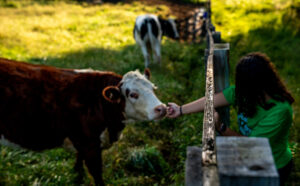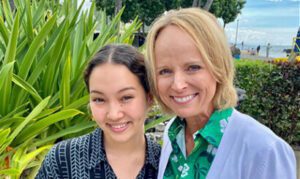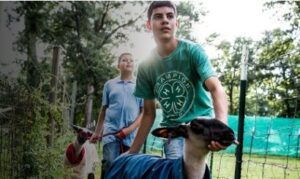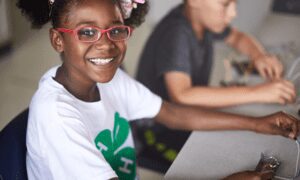Dr. Dawn Mellion-Patin grew up in Iberville Parish, Louisiana, where she was encouraged to join her local 4-H club, which had a majority Caucasian membership at the time.
“There may have been one or two African American kids in the local 4-H club,” she remembers. “Now that I think about it, those of us who joined 4-H were hand-picked; I believe my teachers were trying to integrate 4-H.”
Although Dr. Mellion-Patin did not grow up around agriculture, she received undergraduate, graduate, and doctorate degrees in the field, as she realized early on that was where she belonged. Today, Dr. Mellion-Patin is Vice Chancellor for Extension* and Outreach at Southern University. She shared with me her journey in agriculture, as well as her views on the impact of 1890 land grant universities**.
What was your 4-H experience like for you?
DMP: I was an active 4-H’er in elementary school from 1977 through 1980. Before joining, I noticed 4-H’ers were showing their projects—from animals to sewing to cooking—at our local annual fair. I think our teachers wanted us to have similar opportunities and experiences.
What are some of the stand-out skills or experiences you may have taken from 4-H that became the foundation of where you are today?
DMP: I would have to say confidence. I’m from the deep south of Louisiana, and when I was in elementary school, schools were just beginning to integrate. There were 30 kids in my class, 25 white students—with the majority placed in higher aptitude classes—and five black students. By encouraging me to join 4-H, my teachers made sure that I was exposed to more learning opportunities and experiences—like what my white classmates receivedwhere I gained confidence and improved my public speaking skills.
You talked about the influence of your teachers. Did you have any other mentors growing up who paved the way for you?
DMP: When I was growing up, my minister, doctor, and several other people in the community rallied behind me. However, most of my mentors have been individuals at various levels of my education. I have mentors who would not let me quit even when I wanted to. Sometimes it just takes people to lift your hopes. These types of mentors understand the importance of giving back and being of service to the community. I like to think that I’ve done the same for my students.
Did 4-H influence your decision to major in agriculture?
DMP: My first major was pre-med chemistry, and 4-H did not influence that. I started focusing more on agriculture and realized very early on that it was where I was supposed to be. I changed my undergrad major to plant and soil sciences. When I got into agriculture, I remembered my 4-H experiences and started reading more about the field. It was wonderful learning about and studying agriculture for the first time! As a kid, I did not associate my involvement in 4-H with agriculture, but by the time I got to college, everything came full circle.
What led you back to Extension after finishing college?
DMP: I received my master’s degree in agricultural education at Southern, and those studies took me from being a student of Extension to a practitioner of Extension. When pursuing my doctorate at Iowa State University, I decided to major in Extension agriculture and Extension education, because I knew the positive impact 4-H had on me as a child. After receiving my doctorate, I had an opportunity to go back to my alma mater, where I earned an outreach and a teaching appointment. In 2003, I resigned from my tenure teaching post and joined Extension full-time.
What did it take for you to get to where you are today, and how did you overcome the obstacles of being an African American woman in your profession?
DMP: It took self-confidence, for which I can credit my mentors who always encouraged my growth and development. Reading also enables me to feel more confident and comfortable in conversations and situations in which I may lack experience.
I was also in the Louisiana Army National Guard for eight years, before attending Iowa State. When you have that type of experience, it sets you apart from your peers. When my studies became challenging or when I experienced unbelievable isolation in graduate school, I had to dig deep. As African Americans, we’re always told, “You have to be better; you can’t be average; you have to do more.” It was something I heard from the 1st grade, so I never got comfortable and continued pushing for more.
How are 1890 institutions continuing to open doors for students, and how are you expanding that knowledge in the community?
DMP: Two of the biggest things that these universities contribute to future generations are exposure and a combination of compassion and tolerance. We fully understand the challenges that some of the students face who come through the door. We still receive first-generation college students, students who come from marginalized backgrounds, and students who’ve had a rough way to go—both African American and Caucasian. A lot of the university staff were also first-generation college students, so we understand and show compassion for their struggle, and offer a lot of encouragement.
What do you think it will take to empower more minority youth to seek out leadership roles through youth development organizations and schools?
DMP: There needs to be more exposure to impactful opportunities. Through a grant program, we have several gardens for elementary and middle school students. Access to these gardens has inspired the kids to consider agriculture as a major at Southern University. A lot of kids just aren’t familiar with the career opportunities available, so it’s essential to show them.
What is your vision for the next generation of African Americans in education, leadership, and agriculture, or any other profession?
DMP: I would like them to have a broader reach, a more significant focus, and increased opportunity. My generation feels responsible for uplifting our communities. In this new age of technology, nothing should be limited to a community any longer. I want the next generation to be bold enough to step through the doors that are opening and open new doors. I hope that they have the confidence to know that they belong, to have the skillsets to make them valuable contributing members of society, and to have the wisdom to know what they need to accomplish.
















